2021 STATE OF OUR CITIES
Broken Joburg’s voters get ready to hang the council
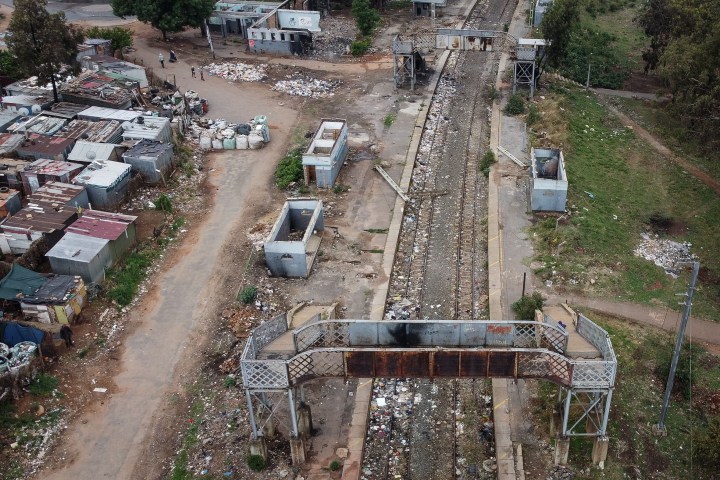
There are now 421 power cuts a day in Johannesburg and regular water shedding. All polls show there will be no outright winner of this ballot.
Johannesburg’s people have proven feisty suitors to the political parties that have come knocking. The governing ANC has had the most challenging time in Soweto, the city district that is home to more than one million voters.
Johannesburg has a heaving and shifting population of 5.74 million that grows by 3,027 people a month. The city estimates that by 2024, at current domestic migration rates, there could be 16.2 million people in Johannesburg.
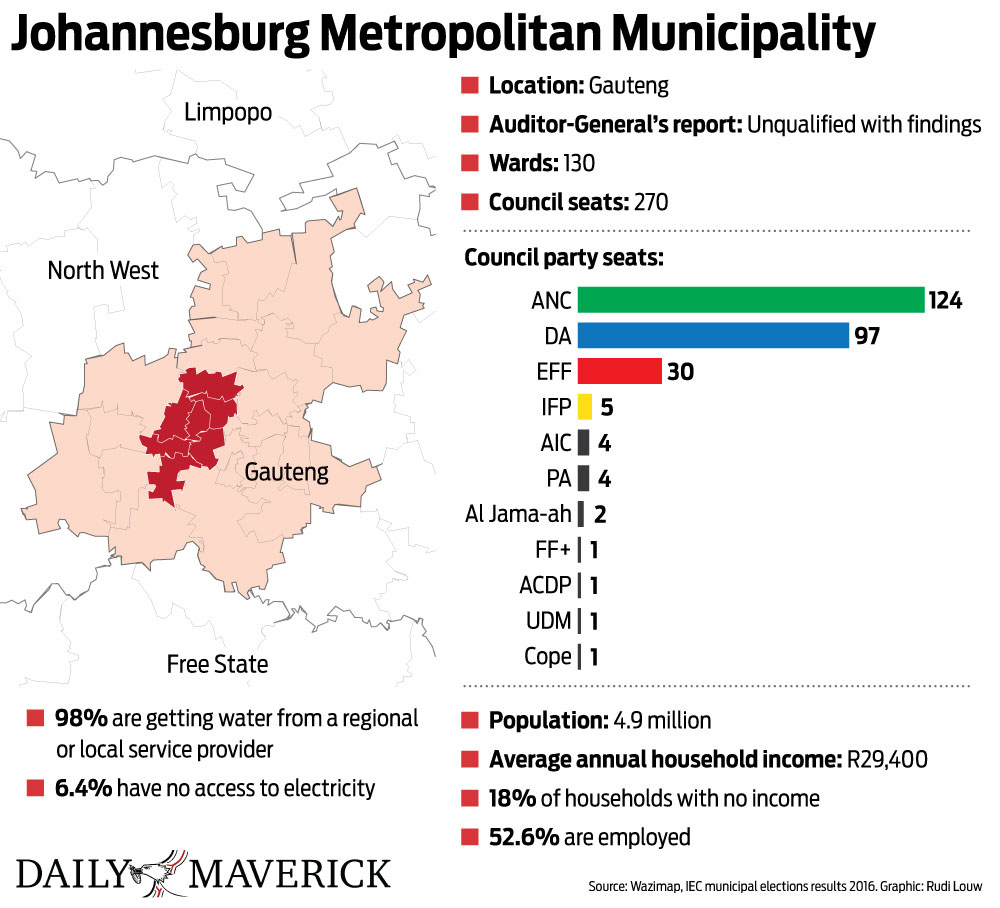
Covid-19 has knocked the socks off the city and job losses have hit hard. Homeless or jobless people ask for something at every quadrant of an intersection; homelessness is visible in the city’s many parks and even in its graveyards. The latest integrated development plan (IDP) for Johannesburg claims a housing backlog of 448,000, which means there are more homeless people in the city than anywhere else in South Africa.
Because Johannesburg is growing so fast with inward migration, the bulge has strained infrastructure. In addition to load shedding, City Power, the municipal electricity company, has reported 38,390 power cuts between April and June 2021, the latest period for which its reports are available. The IDP says 92.3% of households have electricity. But increasingly, the high cost means households are reverting to older forms of energy for cooking. Supply is so erratic, outages can last for days.
Water shedding is now standard, and Johannesburg’s leading mother and child hospital, Rahima Moosa, runs off a borehole fitted and operated by the charity Gift of the Givers. Four in 10 litres of water consumed in Johannesburg aren’t billed and are classified as non-revenue water, which strains the city’s ability to maintain infrastructure. In 2020/21, Joburg Water reported 55,863 cuts, and since then, the pace of water restrictions, shortages and supply cuts have gone up.
Disillusion characterises the Joburg voter, most of whom will stay away on 1 November: research for the ANC has shown that its members don’t cross the floor, but they will stay away. The party would be happy with a straightforward majority win, but campaigners say early research and polling show the party is stuck at 40%. DA support is also below 40%, while an October poll for ActionSA led by Herman Mashaba found the party could take 31%.
There won’t be a winner as residents are in a hanging mood. Most polls show turnout will be low: in the 2016 local government election, motivated voters bucked the trend to reach a turnout high of 58%, but this time that number could dip below 48%, the lowest turnout in the 2000 local government poll. A low turnout benefits the opposition.
Broken
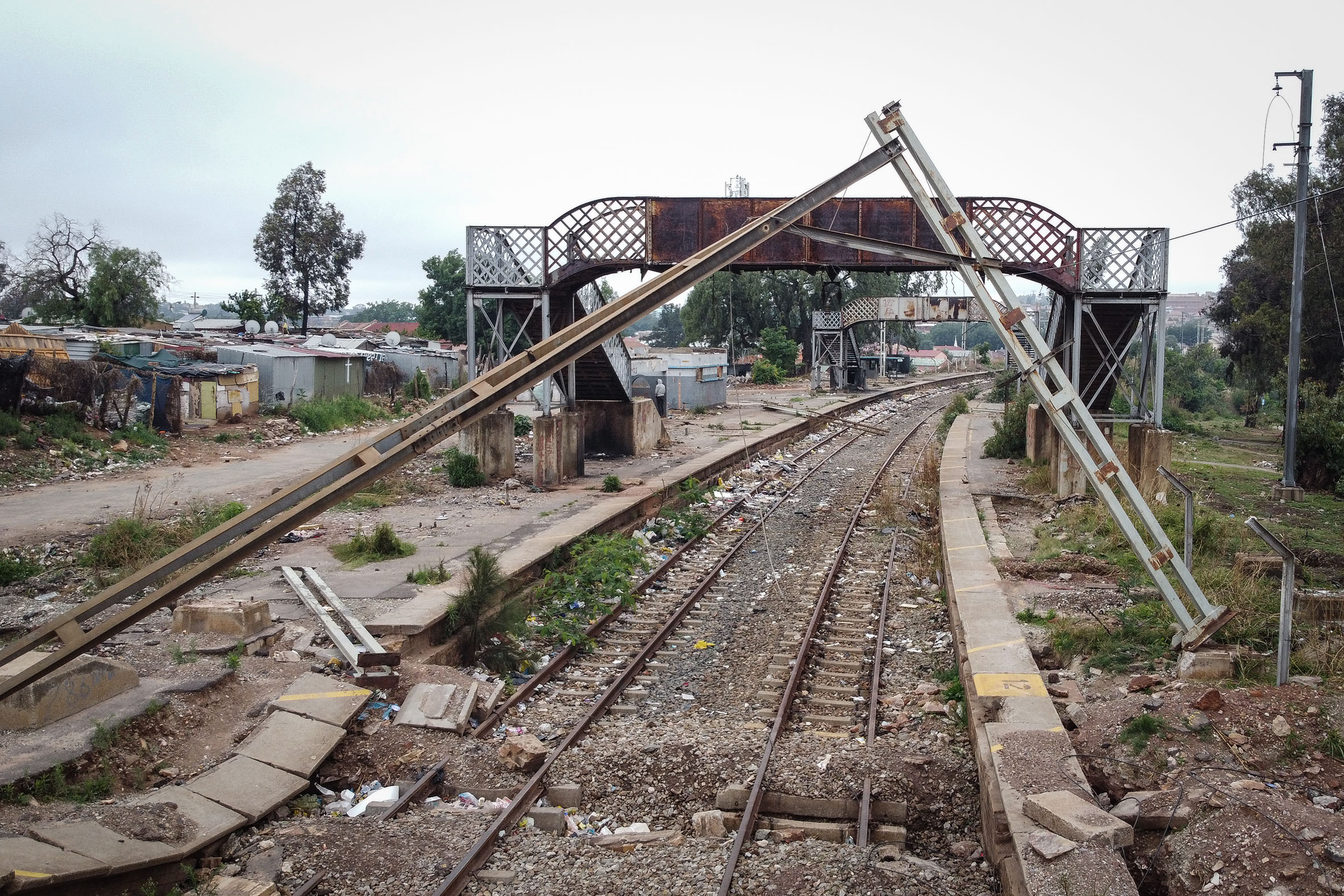
Shattered Newclare Station, with pylons across the lines and shacks built nearby. The stations have water and electricity, attracting homeless people. The ticket offices and benches are in ruins. (Photo: Shiraaz Mohamed)
This used to be my local station when I grew up in Bosmont. It was part of the map of our lives: my godmother lived on the other side of the line, my mother and the community used it to travel to work and later on, my friends and I travelled to university by train sometimes. Metrorail moved the city’s workers from the group areas into the metropolis and home again at night.
Until the destruction of the metro trains in the years in which the Passenger Rail Agency (Prasa) was shattered by corruption, the trains still provided a cheap way to move South Africans in the city. Now, nothing is left.
The images here show what used to be a station. Look at the pylons, the bridge, the tracks and the ticket box. Like in other cities, shacks are built almost on to the lines.
People build their shacks near stations because there are water and plug points from which to pull electricity.
One of the reasons for the city grid’s collapse is illegal connections. It is completely broken, a symbol of the wider city. The local governance systems of electricity, water, housing, dumping and sewerage are in terminal service decline. Earlier in 2021, Gauteng High Court Judge President Dunstan Mlambo had urgent meetings with the city to complain about increasing crime and dirt in the court precinct in the inner city.
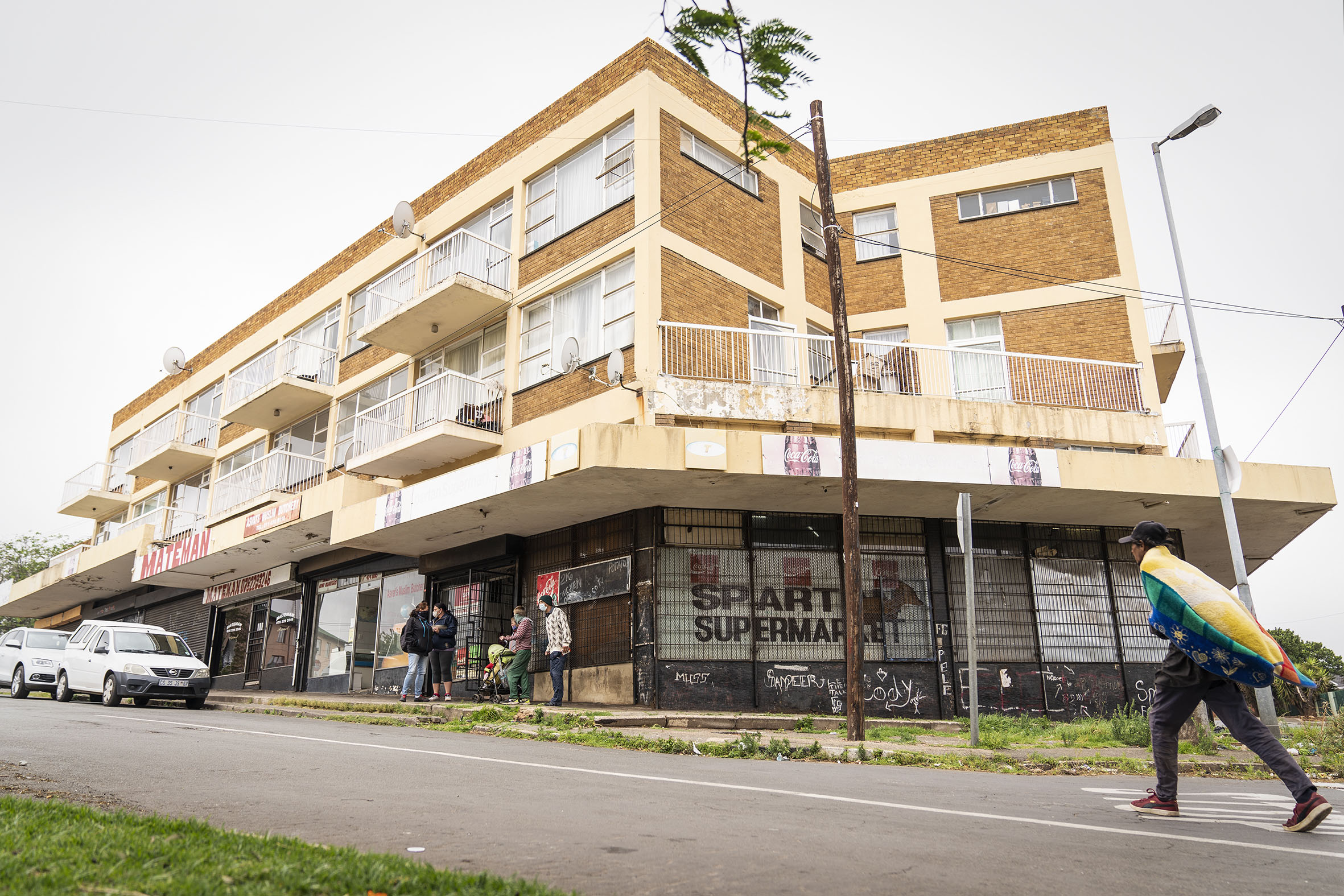
La Fiesta Flats where Ferial Haffajee grew up in Bosmont, Johannesburg. (Photo: Shiraaz Mohamed)
This is where I grew up in Bosmont, with big dreams of what freedom would bring to catapult us out of crushing conditions. Then activist, now ANC Deputy Secretary-General Jessie Duarte and her family lived up the road. Along with other activists, they corralled us into the struggle against the cruel system that landed us in this group area.
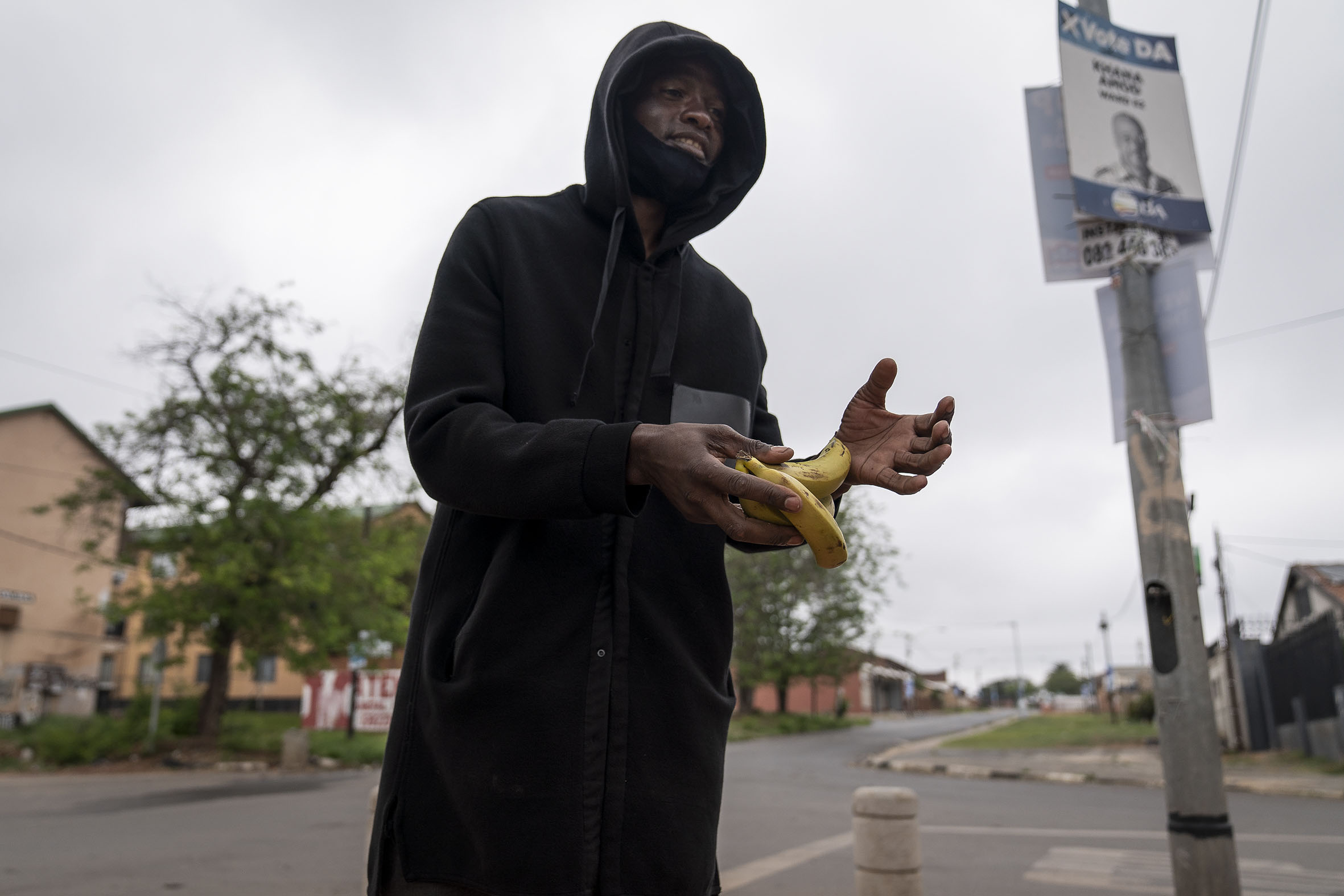
A fruit and vegetable vendor near La Fiesta Flats in Bosmont, Johannesburg. It is as if time has stood still in the past 28 years, with no evidence of a people-centred local government. (Photo: Shiraaz Mohamed)
What strikes me when I visit now is how little has changed and how those dreams of what a future Bosmont, Newclare or Western might look like have been shattered. We were schooled in revolutionary texts about what development would bring to the townships of apartheid — social housing, beautiful public schools providing quality education, playgrounds, fantastic transport and working infrastructure.
Spatial apartheid would by now be dead as clever urbanism would have linked the metropole to the reserve. Instead, there is an air of time having stood still, a place where freedom and democracy have no demonstrable shape. The city government is invisible here, and the posters that adorn poles are a reminder of the hollowness of party politics and the ballot box. It’s no wonder that most people, but not all people, will stay away. Vote? For what?
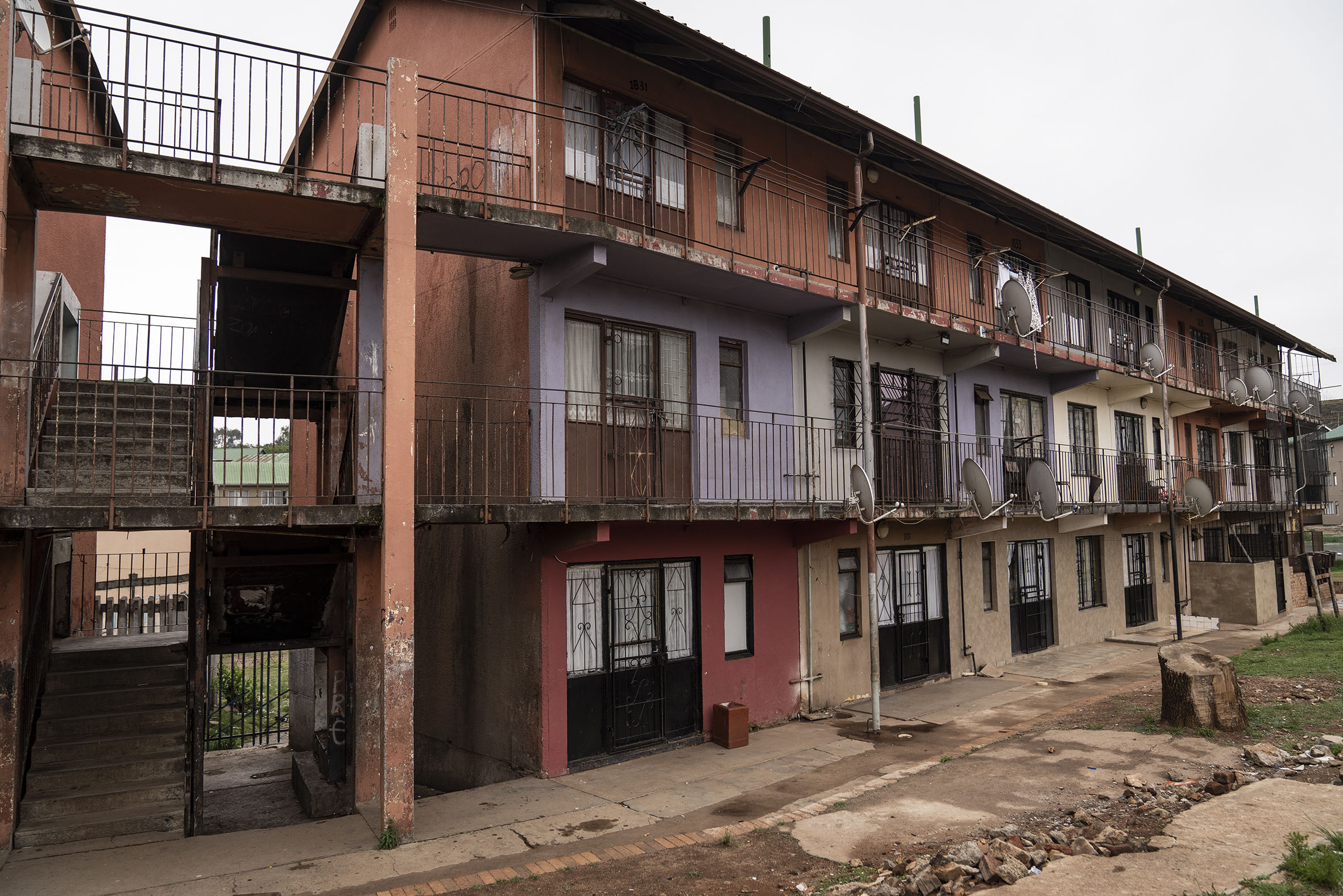
The municipal flats in Newclare where Ferial Haffajee’s grandmother lived. (Photo: Shiraaz Mohamed)
My gran lived across the road from us in these municipal flats. I wanted to see if the ANC promise of a better life or the DA promise of getting things done had shown up here at all. Nothing had changed in almost 30 years; there was no shift in the spatial set-up, no visible development except for a Johannesburg Development Agency billboard announcing a stormwater drainage project. Life is still nasty, brutish and short. Life expectancy across South Africa improved in the freedom years, but Covid-19 has lopped off years in a cruel reversal of fortune.
The streets here are named after Albertina Sisulu and Rahima Moosa, women leaders who defined social service and selflessness for the people. It seems a cruel act by bureaucrats to call the streets for them and then do nothing for the people who live there.
Johannesburg has a vast and bloated staff bill, but no consequent service dividend is clear. The city spends about 30% of a R78-billion budget paying its staff and then adds a further 10% to 15% paying contractors to do the work that the full-timers don’t.
The IDP has pages and pages of promises made to Johannesburg’s people. Still, there is little evidence of delivery on those promises on the ground, and that is what has made the campaign so fiery, especially for the ANC, which governs the city in an alliance with the IFP, Al Jama-ah and a fracture of smaller parties.
‘Covid put everyone out of business’
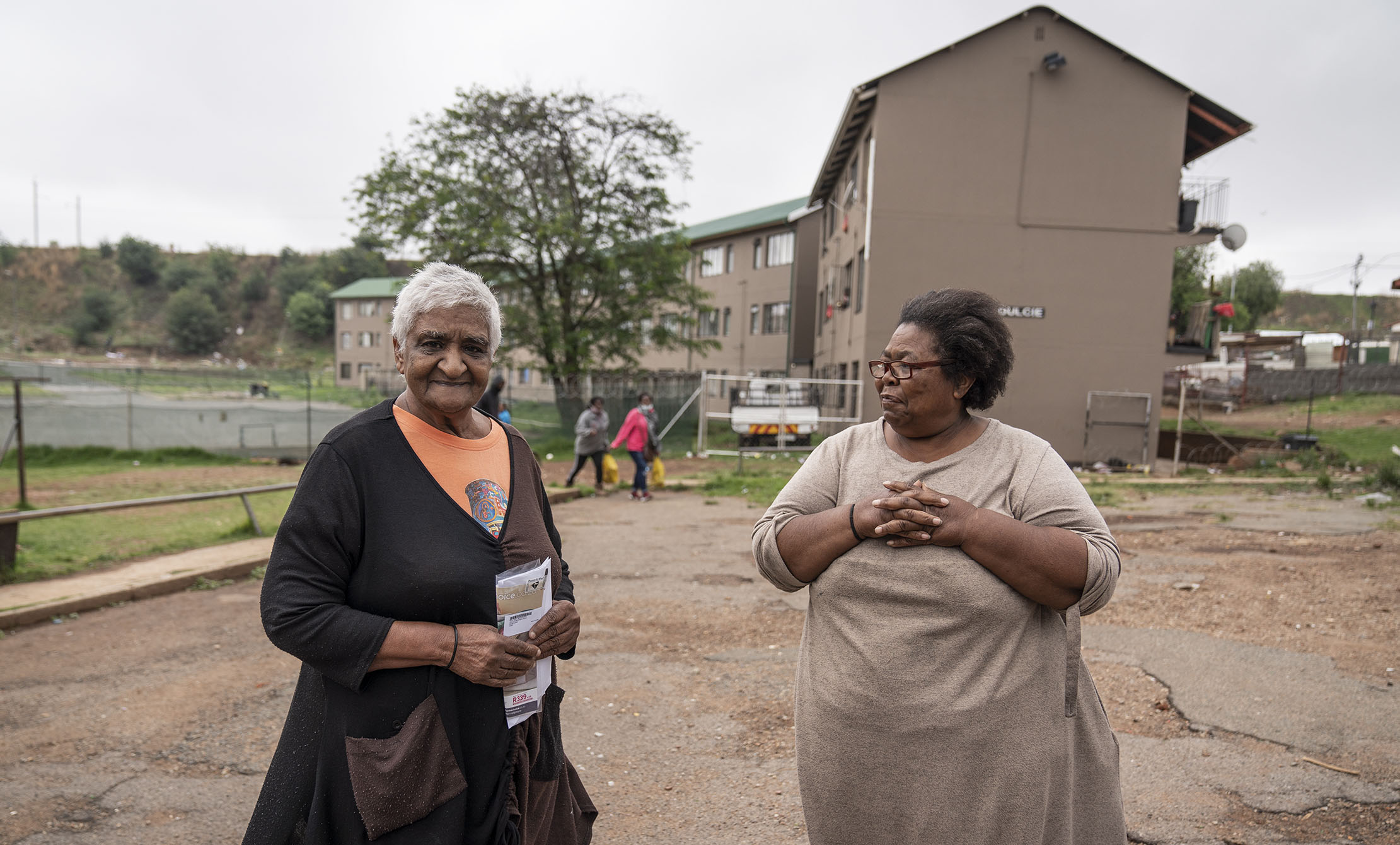
Mary Mahomed (left) and Enez Pienaar (right) at the entrance of the municipal flats in Newclare. (Photo: Shiraaz Mohamed)
Enez Pienaar is the committee representative for Dulcie Flats, which burnt down last December, as documented here by Shiraaz Mohamed. She used to teach at a Sparrow school and still has the authority of that role about her.
The city fixed the flats and made them pleasant, and now Joshco, the Johannesburg housing company, wants rent of R3,000 a month. Pienaar says unemployment in the flats is at “95%” by her estimates.
When my gran lived here, people worked as clerks or admin assistants in retail, banks, the local industrial area called Industria, the clothing sector, or as teachers. When freedom opened up apartheid’s siege economy, the clothing sector collapsed, rendering people unemployed. Bank mechanisation pushed more people into a dead-end street of being too low-skilled for a new financial services economy. Now, Covid has turned a problem into a crisis.
My father was one of those clothing workers, but we had guardrails in the form of my brother and later myself, who could help our family out of the dire straits. Not everybody was that lucky.
“I am voting for someone who will bring change. We want to see change with the young people. People get a matric and that’s where it ends,” Pienaar says. What does change look like for her? She lines up relatively modest on-ramps to what a better life might look like.
They want the “Wendies” to stay — these are temporary wooden Wendy houses the council put up when Dulcie Flats burnt down. Pienaar says they should be able to live rent-free in social housing. “In Covid people lost their jobs. Covid put everyone out of business.”
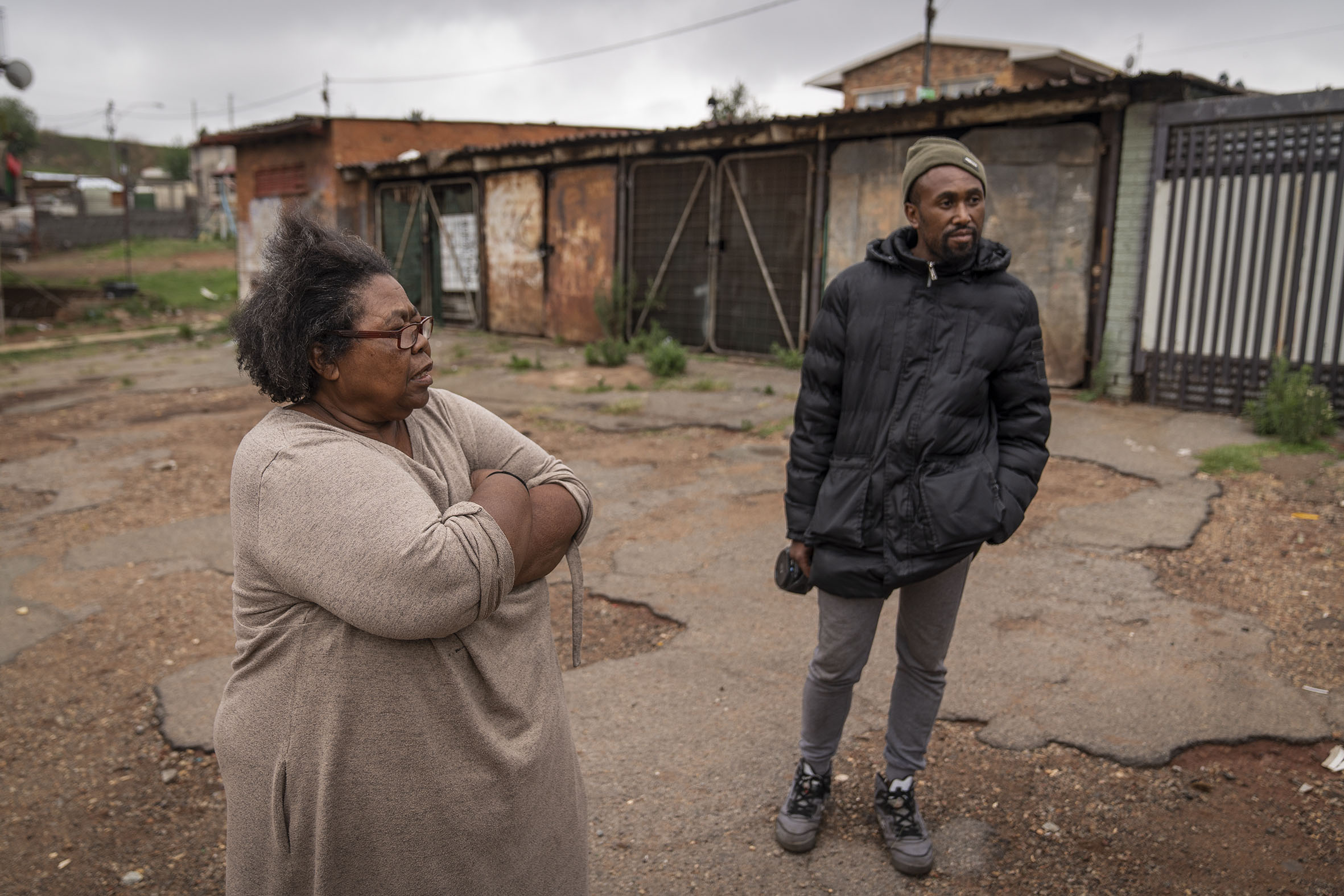
Enez Pienaar (left) and her son Conlyn of Newclare say young people need opportunities to work. In the flats they say unemployment is ninety percent. (Photo: Shiraaz Mohamed)
People of working age are everywhere on a weekday; the signs of unemployment. “Us coloureds don’t get jobs here,” says Pienaar.
In Soweto in October, residents marched on a local KFC to protest against the employment of foreign people by the chicken franchise. High joblessness and poverty are typical flintstones for the flame of “othering”, whether by race or place of birth.
Xenophobia is a heartbeat issue in the 2021 campaign. Many parties in Johannesburg campaigned on an anti-foreigner ticket. ActionSA has identified the employment of foreigners as a critical issue; the DA has met the dean of ambassadors in Pretoria to discuss “illegal immigration”. The Patriotic Alliance has used the twin planks of coloured identity and the preponderance of foreign-owned shops and spazas in townships to expand its beachhead. The party’s leader, Gayton McKenzie, is likely to become a power player when the coalition is struck to run Johannesburg after the election.
But the ANC’s candidate, Kamil Allie, is popular among voters here because he grew up in the area. For the first time in 2021, the ANC has run candidate primaries in wards, and potential councillors had to present themselves to communities.
A cemetery called home
Homelessness in Johannesburg is so severe that the city appears to have thrown up its hands in helplessness, as Mark Heywood has reported.
People sleep rough under the highways, in parks and even in the Brixton Cemetery, which is now home to many people who sleep between the graves, says Nurodene Otto, who lives near a fence across the road from the Brixton fire station. He is 31 years old and shows us around his patch, which he shares on the day we visit with Jabulani Khumalo. His shack is in the southwestern end of the sprawling graveyard, and it has two “rooms” — rough tent-like structures. One room is his, which he shares with his wife, Terry-Ann, who greets but does not come out. He and Khumalo are making porridge on a fire on the morning we visit.
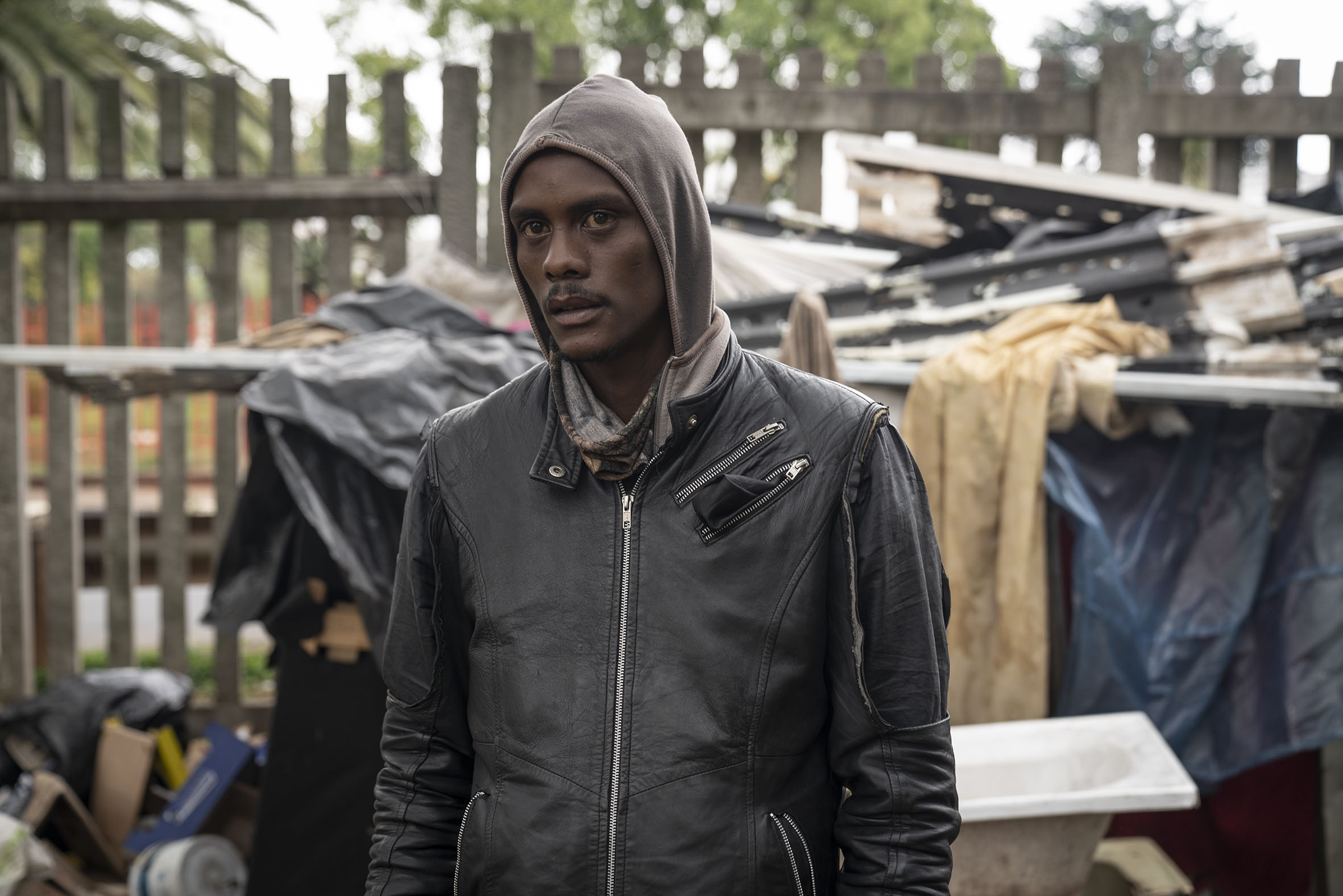
Nurodene Otto in front of his shack in the Brixton cemetery. (Photo: Shiraaz Mohamed)
“There’s plus-minus 50 people living here,” says Otto, who adds that most are Zimbabweans who have found a home among the dead. “Are you scared of ghosts?” photographer Shiraaz Mohamed asks Otto, voicing the question I have thought about whenever I drive past and see the shacks.
“I walk alone, sometimes at two o’clock in the morning,” says Otto, with a young man’s bravado. He admits later that “sometimes I get grille (goosebumps)”. The area with the oldest gravestones, which date to 1830, is the scariest, he says. He chose his spot because the fire station across the road has water and a geyser which means it’s warm, too.
Otto has alert eyes, and he reads my notes as we chat. He has a criminal record that has locked him out of the jobs market, so he and Khumalo hustle at the local shops for recyclables. They can make between R150 and R200 a day selling to the scrap merchants in nearby Newtown. He says cables make the most money.
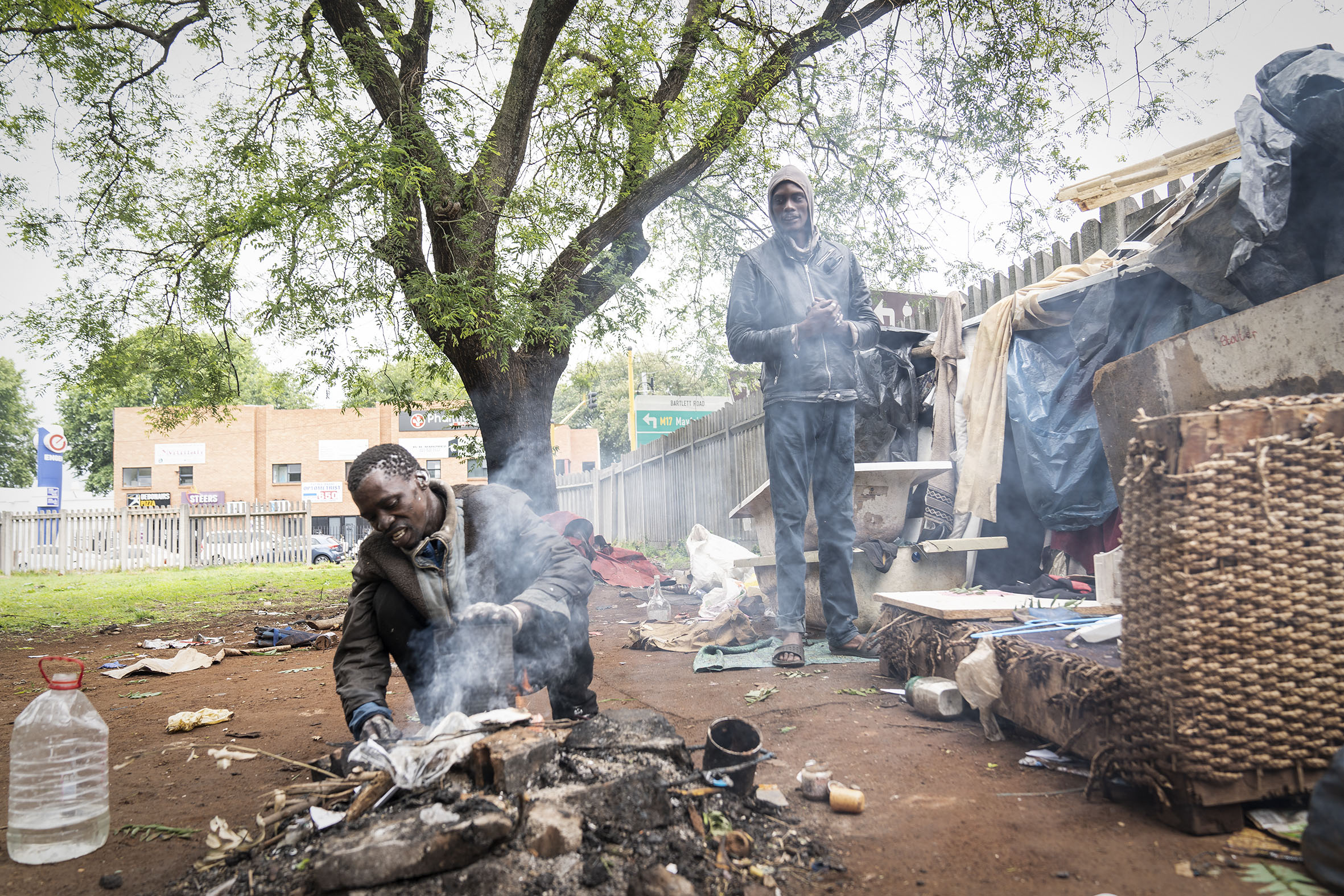
Jabulani Khumalo (left) and Nurodene Otto (right) live in the Brixton cemetery. Here they make morning porridge over a fire. The two-roomed shack is built from recycling material collected in nearby Mayfair and Brixton. The graves don’t scare them much, they say. (Photo: Shiraaz Mohamed)
Cable theft is Johannesburg’s biggest problem. It disables entire electricity networks and is the primary reason the city’s street lights do not work. This, in turn, makes the city the most dangerous in the country, with rising crime rates.
An Ipsos poll for eNCA, out on 27 October, found that safety is the biggest concern for South Africans ahead of the election. When people walking through the graveyard or those visiting the dead were repeatedly attacked, security guards with dogs were posted. Otto says he feels safe living there, although he would love an RDP house to call his own and a trolley to ride his recyclables down to Newtown.
He tells Khumalo not to burn the “polypropylene” buckets, and he explains that they are worth R9 per kilogram at the recycling merchants. Recycling by homeless people is a city growth sector. The city administration can provide better service to this army of sustainability, which it continues to view as a pest rather than an essential part of the circular economy.
A 36-hour power cut
After the cemetery, I get home and there’s no power, likely due to cable theft. It happens very often. I am on a deadline to deliver this article and prepare to quiz the candidates who want to be mayor of Johannesburg. My laptop battery is running out faster than I can type, and all the middle-class safeguards we’ve built (an inverter battery, solar panels, power packs) dissipate one by one as the power cut in my area extends to 36 hours and counting.
Neighbours are furious with the DA councillor who told us to buy solar a few weeks before as he knew what was coming down the line. The infrastructure in the city is too far gone for any politician to be able to promise a quick fix and fulfil that promise.
Johannesburg has a R178-billion infrastructure backlog, which we feel in regular power cuts that often last for days. Eskom’s load shedding makes the fragile city grid fall over as it’s not meant to be switched on and off so often.
In Johannesburg, water shedding is now a trend. I wrote here about how I see people carrying water to bathe by bucket and how it takes me back to times of bucket baths I thought were in the past. The city of gold has lost its glimmer. Before he died tragically from Covid-19, exasperated mayor Geoff Makhubo wrote in Daily Maverick that a flood of articles highlighting the imminent collapse of Johannesburg was exaggerated. He said this narrative was nostalgia for the “white city”. I was sorry there was no opportunity to debate his view.
This big, bustling city of can-do people who survive and dream deserves leaders who do better and do more. With an annual budget of R78-billion, we should be getting more service and life opportunities for the vast range of people who call the city home.
For a leading city, Johannesburg is badly managed and poorly planned, with too many of her most vulnerable citizens left to fend for themselves without the local government making it easier for them. To say so is not nostalgia for a “white city” that didn’t deliver to most of us, but references the legitimate social contract that anybody who wants to lead should honour. DM
[hearken id=”daily-maverick/8798″]
















 Become an Insider
Become an Insider
I suspect that things have passed a tipping point from which there can be no recovery.
And that’s pretty much the state of the nation too. A lot of the blame for this must lie at the feet of the ANC who chose to enrich themselves at the expense of an entire nation
Never say never. Evil triumphs when good people do nothing. We ALL need to get out and vote the ANC out! Now, and in 2024.
Yep, but Joburgers will still re-elect them to loot some more.
No, Jo’burg won’t elect. People will stay away from the polls. My GF isn’t even registered to vote in Johannesburg. She’s still registered in PTA where she studied years ago.
Just imagine what could have been if the anc as an organisation had integrity and honesty and appointed competent people? There is more than enough money in this city to uplift the entire population from where a large portion was during aparthate. Instead the anc got rid of competent council employees (Who were willing and able to educate ‘newcomers’) and deployed mainly useless cadres whose only instruction was AA and to see how quickly they can enrich the anc itself. No matter what the consequences. (We have a very good excuse – aparthate … )
That’s it in a nutshell, integrity, honesty, competent!
What a depressing report, but not unexpected. We blame the ANC, but actually the blame lies with ourselves. That there is as single person still voting for this political failure is unthinkable, but not voting borders on the criminal. What is wrong with us?
Unfortunately the majority (those who have been negatively impacted the most) will continue to vote for the ANC criminal cabal.
As for the rest, I fully agree go out & vote. I keep telling many friends, if you don’t vote then shut up, & stop complaining you’re not entitled to an opinion.
What a brilliant article Ferial, and it is so good (albeit with sadness) to hear about some of your own background. Unfortunately, despite promises by the ANC (and EFF as well as the DA, in coalitions), poverty, poor service delivery, corruption, looting, etc. will continue after the elections. Nevertheless, it is the pictures in your article that brings home the reality of all these wrongs, with the more privileged, including myself, are often so divorced from these horrors.
The more people refuse to vote, the more my vote counts. That should make me happy, but it doesn’t. At the end of the day, voters and non-voters alike get the government they collectively deserve.
Now write this from the perspective of someone who stays in Fourways, works in Fourways and shops in Fourways. What am unequal country.
Shaun you are so right! That’s where I live.. Although I grew up in Yeoville / Berea and Hillbrow. Was there recently and wow… tragic!
But to your point, when I complained on our residents’ what’s app group recently about the corruption / incompetence etc. of Eskom during loadshedding I got told to stop politicising and buy an inverter… Problem solved? We are all safely ensconced in our privileged cocoons.
I’m alright Jack.
Ha,ha the northern suburbs solution.
Tjho! Ferial, Senzeni na? What have we done to deserve this?
No real leadership, no realistic vision of a better collective future, no accountability and no repercussions.
Just about the saddest article I have ever read. Hopelessness seeps out of every sentence, and by the end, it is impossible not to feel totally overwhelmed by feelings of utter despair, hopelessness and angry at the incompetence, greed and selfishness in our ANC-elites who have allowed all this to happen on their watch, even as with the other hand, and seeing the same hopelessness, they steal whatever they can and thereby ever deepening the now crushing morass that used to be, if not affluent, but at least vibrant communities.
There should be a special place in hell for the Zuma, Magashule, Malema, Gigaba …. sadly the list is endless, who allowed all this to occur whilst they ate off their gilded plates.
“and Johannesburg’s leading mother and child hospital, Rahima Moosa”
Clearly Ferial, you have never been to this cesspool.
Rahima Moosa should be demolished and everybody who works there should have their medical licenses taken away. I have never seen a more disgusting hospital with more disgusting, rude nurses in my life. We watched our beloved nanny die in front of us while being messed around by heartless monsters at this hospital for over a year, when all she wanted was treatment.
It is filthy dirty, it stinks, the nurses are USELESS and rude.
South Africa clearly has an ANC problem.
The ANC corruption is killing SA and the cities they run.
The hamster has stolen the cage and the wheel and is at home on stage 5 lockdown.
I look forward to seeing the gallows being erected, hopefully right in front of those municipal flats in Newclare shown in the pic. Special invitations to view the hangings should be issued to all ANC NEC members. Yip, that my hope.
We are a failed state. I am on oxygen 24/7 and had a very scary incident yesterday when Pretoria CBD’s lights went off. I have a small portable concentrator which only works for 2 hours. So, since 15:00 to 18:00 I was without oxygen. Reception at our home charged my concentrator so I could have another 2 hours of oxygen. My children decided that I must go to the frail care where they had a generator so that my electric concentrator could work. My sons had to carry me down 7 floors to reach frail care, as the lifts were not working. Really a scary experience!
they will vote for the same jokers again, they do not learn!
ANC = Avarice Nepotism Corruption
Well named!
Will people take this opportunity to vote out the corruption ridden( please give us another chance) ANC? While the numbers voting for them will have decreased, due largely to stay at homes not party changers, the party will probably still have a high enough percentage to be able to form coalitions in order to ( mis)govern. But with whom?That is going to be the vital question, because the desolation and sadness evident in this excellent article, will be perpetuated if the wrong partners come together.